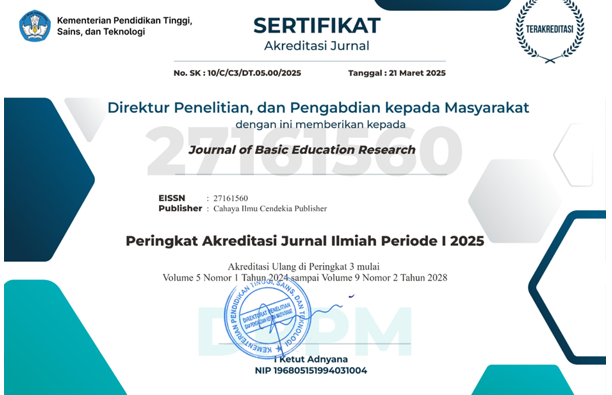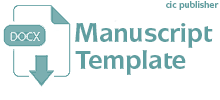Improving Civics Learning Outcomes Through the Problem Based Learning Model for Elementary School Students
Abstract
Purpose of the Study: This study aims to enhance student learning outcomes by applying the Problem-Based Learning (PBL) model in Civics lessons for class VI.A at elementary school 208 Palembang. Specifically, the research explores how PBL fosters critical thinking, problem-solving, and active student engagement in a subject often perceived as theoretical.
Methodology: The study employs Classroom Action Research (CAR), utilizing a cyclical model consisting of four stages: Planning, Implementation, Observation, and Reflection. Data collection methods, including observation, documentation, and tests, are conducted across pre-cycle, cycle I, and cycle II phases, allowing for a comprehensive understanding of PBL's impact on learning outcomes.
Main Findings: The results reveal a significant improvement in students' Civics learning outcomes after implementing PBL. The findings indicate growth in individual and collective performance, including increased student engagement, higher minimum and maximum scores, and a notable rise in average scores. These outcomes suggest that PBL effectively nurtures deeper understanding and retention of Civics concepts by encouraging student participation and collaborative problem-solving.
Novelty/Originality of this Study: This research's uniqueness lies in its contextual application of PBL in the elementary school setting, specifically within Civics education in Palembang. While PBL has been widely studied in other disciplines, its integration into Civics a subject traditionally taught through rote learning offers fresh insights into how inquiry-based learning models can reshape elementary education. This study demonstrates the potential of PBL to create a more dynamic and interactive learning environment, contributing to pedagogical theory and practice.
References
V. P. Sari, and S. Suryaningsi, “Education For Indonesian Citizens: From Good Citizens to Active Citizens,” Asian Journal of Social and Humanities, vol. 1, no. 10, pp. 695-706, 2023, doi: 10.59888/ajosh.v1i10.73.
T. Öztürk, “Project-based civics education: A case study of a university research center,” Participatory Educational Research, vol. 9, no. 2, pp. 53-70, 2022, doi: 10.17275/per.22.28.9.2.
D. B. Edwards Jr, M. Sustarsic, M. Chiba, M. McCormick, M. Goo, and S. Perriton, “Achieving and monitoring education for sustainable development and global citizenship: A systematic review of the literature,” Sustainability, vol. 12, no. 4, pp. 1383, 2020, doi: 10.3390/su12041383.
P. Nuangchalerm, V. Prachagool, A. Nuangchalerm, K. Chimphali, and R. A. Z. El Islami, “Framing citizen science and sustainable education development,” Multidisciplinary Reviews, vol. 7, no. 2, pp. 2024028-2024028 2024, doi: 10.31893/multirev.2024028.
R. K. Wuta, “Citizenship, Citizenship Education and Issues of Implementation in Zimbabwe,” Indiana Journal of Humanities and Social Sciences, vol. 3, no. 10, pp. 39-46, 2022, doi: 10.5281/zenodo.7270620.
S. Narvekar, B. Peng, M. Leonetti, J. Sinapov, M. E. Taylor, and P. Stone, “Curriculum learning for reinforcement learning domains: A framework and survey,” Journal of Machine Learning Research, vol. 21, no. 181, pp. 1-50, 2020, doi: 10.48550/arXiv.2003.04960.
M. M. Plack, W. E. Healey, K. Huhn, E. Costello, J. Maring, and M. J. Hilliard, “Navigating student challenges: From the lens of first-year doctor of physical therapy students,” Journal of Physical Therapy Education, vol. 36, no. 1, pp. 76-86, 2022, doi: 10.1097/JTE.0000000000000212.
C. E. Sanders, A. R. Byrd, K. E. Gibson, A. Golson, K. W. Lamm, and A. J. Lamm, “Teaching systems-thinking concepts with hypothetical case scenarios: An exploration in food-systems science education,” Foods, vol. 12, no. 14, pp. 2663, 2023, doi: 10.1080/02671522.2020.1767184.
C. A. Bertram, C. C. N. Mthiyane, and J. Naidoo, “The tension between curriculum coverage and quality learning: The experiences of South African teachers,” International Journal of Educational Development, vol. 81, pp. 102353, 2021, doi: 10.1016/j.ijedudev.2021.102353.
Z. V. Zhang, and K. Hyland, “Fostering student engagement with feedback: An integrated approach,” Assessing Writing, vol. 51, pp. 100586, 2022, doi: 10.1016/j.asw.2021.100586.
M. Cents-Boonstra, A. Lichtwarck-Aschoff, E. Denessen, N. Aelterman, and L. Haerens, “Fostering student engagement with motivating teaching: An observation study of teacher and student behaviours,” Research Papers in Education, vol. 36, no. 6, pp. 754-779, 2021, doi: 10.1080/02671522.2020.1767184.
C. H. H. Tsay, A. K. Kofinas, S. K. Trivedi, and Y. Yang, “Overcoming the novelty effect in online gamified learning systems: An empirical evaluation of student engagement and performance,” Journal of Computer Assisted Learning, vol. 36, no. 2, pp. 128-146, 2020, doi: 10.1111/jcal.12385.
S. Shanks, and J. J. Zhang, “Disentangling perception and performance: A natural experiment on student engagement and learning in simulations,” Journal of Political Science Education, vol. 20, no. 2, pp. 292-317, 2024.
E. A. Enright, W. Toledo, S. Drum, and S. Brown, “Collaborative elementary civics curriculum development to support teacher learning to enact culturally sustaining practices,” The Journal of Social Studies Research, vol. 46, no. 1, pp. 69-83, 2022, doi: 10.1016/j.jssr.2021.11.007.
K. L. Dobbs, L. M. Hsu, S. Garrone-Shufran, N. Barber, F. Kourouma, Y. Perez-Castillo, and S. Rich, “Centering Youth Voices: An Interdisciplinary and Transdisciplinary Approach to Civic Engagement,” Issues in Interdisciplinary Studies, vol. 40, no. 2, pp. 11-38, 2022.
D. Oktavianti, “Analysis of the Citizenship Education Curriculum in Elementary Schools: Challenges and Opportunities,” International Journal of Students Education, vol. 2, no 1, pp. 58-69, 2024, doi: 10.62966/ijose.v2i1.609.
S. Sucipto, W. Setiawan, and A. Hatip, “The effectiveness of collaborative learning on civic education problem-solving abilities based on cognitive styles,” Research and Development in Education (RaDEn), vol. 4, no. 1, pp. 149-161, 2024, doi: 10.22219/raden.v4i1.32253.
H. M. Fahimah, T. Martono, and K. B. Sangka, “A Systematic Literature Review of Edmodo's Best Practice Implementation for Problem-Based Learning in the Education Sector,” International Journal of Multicultural and Multireligious Understanding, vol. 9, no. 6, pp. 418-435, 2022, doi: 10.18415/ijmmu.v9i6.3802.
S. Suharsiwi, U. Usmiyatun, and M. Siddique, “Current Social Studies Learning: Technology-Based Learning Media for Character Education,” Edutechnium Journal of Educational Technology, vol. 2, no. 1, pp. 25-42, 2024, doi: 10.51773/ajst.v3i2.243.
Z. Ngiu, N. Q. Laila, A. H. Panai, R. Yunus, and C. Cuga, “Strengthening Civic Education in a Multicultural School: A Local Wisdom Approach,” Eurasian Journal of Educational Research, vol. 108, pp. 213-228, 2023, doi: 10.14689/ejer.2023.108.012.
B. Burnes, “The origins of Lewin’s three-step model of change,” The Journal of Applied Behavioral Science, vol. 56, no. 1, pp. 32-59, 2020, doi: 10.1177/0021886319892685.
D. Messikh, “A systematic review of the outcomes of using action research in education,” Arab World English Journal (AWEJ), vol. 11, no. 1, 2020, doi: 10.24093/awej/vol11no1.32.
A. B. Eder, and D. Dignath, “Associations do not energize behavior: on the forgotten legacy of Kurt Lewin,” Psychological Research, vol. 86, no. 8, pp. 2341-2351, 2022, doi: 10.1007/s00426-021-01631-1.
A. N. Bhayangkara, W. H. Ahmadi, D. B. Firdaus, D. Prestiadi, and R. B. Sumarsono, “The role of instructional leadership through Kurt Lewin model in improving the teacher capability,” In 2nd Early Childhood and Primary Childhood Education (ECPE 2020) (pp. 307-317). Atlantis Press. 2020, November, doi:
2991/assehr.k.201112.054.
S. M. D. Meilasari, and U. Yelianti, “Kajian model pembelajaran problem based leraning (pbl) dalam pembelajaran di sekolah [Study of problem based learning (PBL) learning models in school learning],” Jurnal Pendidikan Biologi dan Sains, vol. 3, no. 2, pp. 195-207, 2020, doi: 10.31539/bioedusains.v3i2.1849.
B. R. Belland, D. M. Weiss, and N.J. Kim, “High school students’ agentic responses to modeling during problem-based learning,” The Journal of Educational Research, vol. 113, no. 5, pp. 374-383, 2020, doi: 10.1080/00220671.2020.1838407.
C. C. Cheng, and Y. T. Y. Yang, “Impact of smart classrooms combined with student-centered pedagogies on rural students’ learning outcomes: Pedagogy and duration as moderator variables,” Computers & Education, vol. 207, 104911, 2023, doi: 10.1016/j.compedu.2023.104911.
M. M. Chusni, S. Saputro, and S. B. Rahardjo, “Student's critical thinking skills through discovery learning model using e-learning on environmental change subject matter,” European Journal of Educational Research, 10(3), 1123-1135, 2021, doi: 10.12973/eu-jer.10.3.1123.
V. Sukackė, A. O. P. D. C. Guerra, D. Ellinger, V. Carlos, S. Petronienė, L. Gaižiūnienė,... and A. Brose, “Towards active evidence-based learning in engineering education: A systematic literature review of PBL, PjBL, and CBL,” Sustainability, vol. 14, no. 21, pp. 13955, 2022, doi: 10.3390/su142113955.
S. M. Loyens, J. E. Van Meerten, L. Schaap, and L. Wijnia, “Situating higher-order, critical, and critical-analytic thinking in problem-and project-based learning environments: A systematic review,” Educational Psychology Review, vol. 35, no. 2, pp. 39, 2023, doi: 10.1007/s10648-023-09757-x.
Vodovozov, V., Raud, Z., & Petlenkov, E. (2021). Challenges of active learning in a view of integrated engineering education. Education Sciences, 11(2), 43, 2021, doi: 10.3390/educsci11020043.
A. Uzun, A. Onur, and S. Alabay, “Students' views on database management systems course designed according to problem-based learning,” International journal of evaluation and research in education, vol. 9, no. 1, pp. 177-187, 2020, doi: 10.11591/ijere.v9i1.20501.
A. Mahmudah, “Peningkatan hasil belajar pkn melalui model pembelajaran problem based learning (pbl) pada siswa kelas v mi manba’ul ulum Buntaran Kecamatan Rejotangan Kabupaten Tulungagung [Improving civics learning outcomes through the problem based learning (PBL) learning model for class V students of MI Manba'ul Ulum Buntaran, Rejotangan District, Tulungagung Regency],” Jurnal Pembelajaran dan Riset Pendidikan (JPRP), vol. 2, no. 2, pp. 118-134, 2022, doi: 10.28926/jprp.v2i2.365.
Anggraeni, A., & Muhammadi, M. (2023). Peningkatan Hasil Belajar PPKn Menggunakan Model Problem Based Learning dalam Nuansa Kurikulum Merdeka di Sekolah Dasar. e-Jurnal Inovasi Pembelajaran Sekolah Dasar, 11(1), 135-147, 2023, doi: 10.24036/e-jipsd.v11i1.
Copyright (c) 2024 Meri Hartati, Dong Anh Chi Hong

This work is licensed under a Creative Commons Attribution 4.0 International License.
Authors who publish with this journal agree to the following terms:
- Authors retain copyright and acknowledge that the Journal of Basic Education Research is the first publisher licensed under a Creative Commons Attribution 4.0 International License.
- Authors are able to enter into separate, additional contractual arrangements for the non-exclusive distribution of the journal's published version of the work (e.g., post it to an institutional repository or publish it in a book), with an acknowledgment of its initial publication in this journal.
- Authors are permitted and encouraged to post their work online (e.g., in institutional repositories or on their website) prior to and during the submission process, as it can lead to productive exchanges and earlier and greater citation of published work.





.png)


.png)
.png)


















